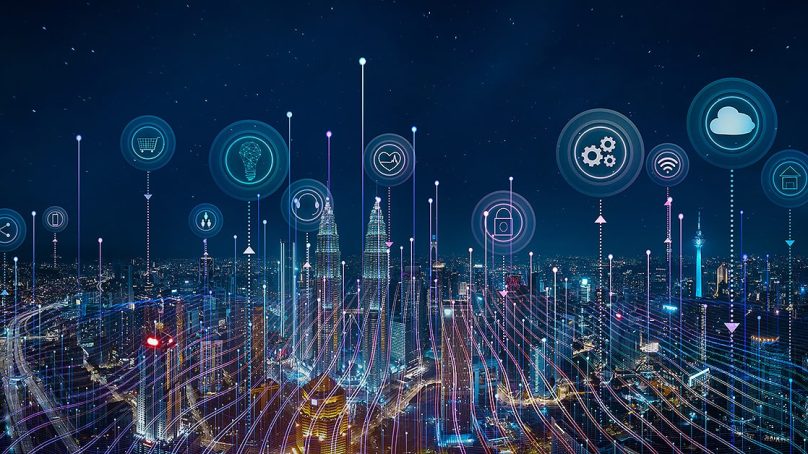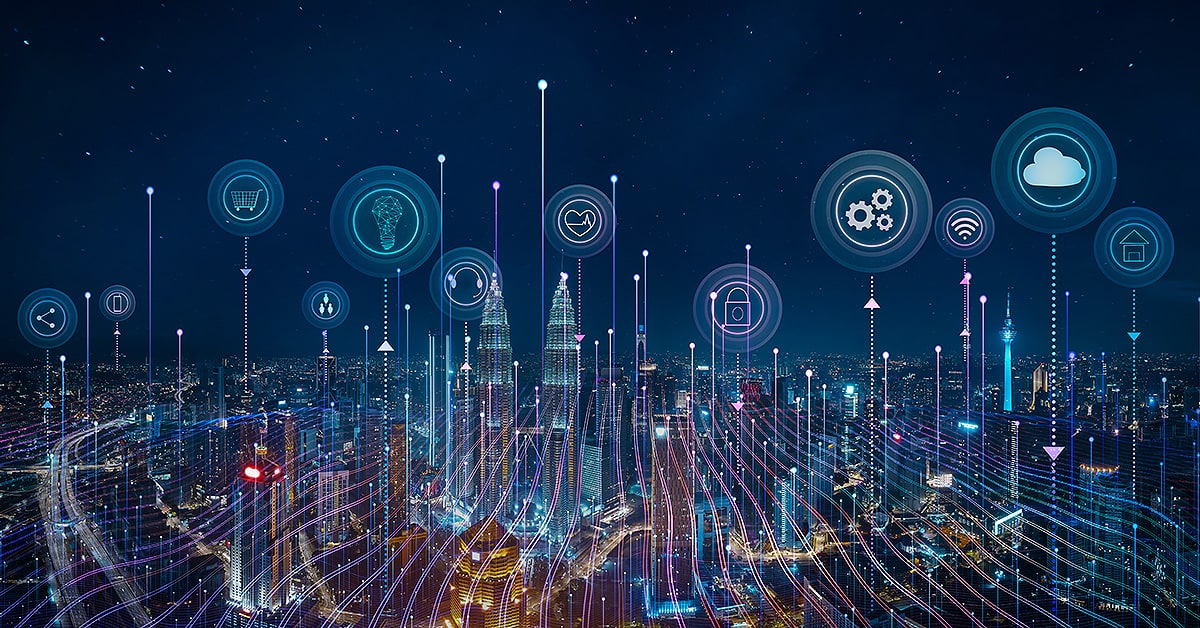

Moreover, smart cities integrate advanced technologies such as AI, IoT and data analytics effectively.
Specifically, these technologies aim to create more efficient, connected, and sustainable urban environments, benefiting both residents and visitors in the region. For the hospitality industry, this technological revolution represents a transformative opportunity to enhance guest experiences and improve operational efficiency.
Furthermore, by adopting smart city innovations, hotels can stay competitive and thrive in an increasingly digitally connected world.
What defines a smart city?
A smart city optimizes infrastructure and services using technology to improve the overall quality of life for residents and visitors. In particular, cities like Dubai, Abu Dhabi and Riyadh are leading the way with advanced smart city initiatives in the Middle East.
Specifically, these cities integrate the “work, live, play” concept, where business, residential and leisure spaces are seamlessly connected for convenience. As a result, this presents a unique opportunity for the hospitality industry to cater to the local community and multifunctional guests.
Moreover, multifunctional guests blend business and leisure, a trend growing both globally and in the Middle East. According to the United Nations, 68 percent of the world’s population will live in urban areas by 2050, highlighting the importance of smart cities.
Therefore, with urban challenges increasing, smart cities aim to optimize public services, improve resource management, and create more sustainable environments. For hospitality operators, aligning with these smart city goals is essential to secure future success in the Middle Eastern market.
Smart cities and hospitality: embracing technology
The hospitality sector in smart cities can utilize technologies such as IoT and AI to deliver hyper-personalized guest experiences. For instance, IoT-enabled rooms allow hotels to adjust lighting, temperature, and entertainment based on individual guest preferences, creating customized stays. Additionally, AI can streamline operations by automating check-ins through facial recognition and providing real-time, on-demand services for guests. Consequently, these technological integrations significantly enhance both the overall guest experience and the operational efficiency of hotels.
For hotels, integrating with these smart city ecosystems will allow them to cater to the growing expectations of modern guests.
In conclusion, by offering seamless transportation, personalized services and smart room features, hotels can fully embrace the smart city revolution and thrive.
The “work, live, play” model: catering to bleisure guests
Smart cities embody the “work, live, play” concept, a model perfectly aligned with the growing trend of “bleisure” travel. According to a Deloitte report, 70 percent of business guests extend their trips for leisure, highlighting a significant shift in traveler behavior.
Particularly in the Middle East, where luxury and high-end experiences dominate, this trend presents a valuable opportunity for hotel operators. By capitalizing on this trend, hotels can create flexible, multifunctional spaces catering to guests mixing business and relaxation seamlessly.
Moreover, hotels in smart cities can offer work-friendly environments equipped with high-speed internet, smart meeting rooms, and video conferencing facilities. During the day, these spaces provide a professional atmosphere, while in the evenings they transform into relaxation-focused leisure spaces.
This flexibility, offering the best of both worlds, will be essential for attracting modern guests who want to blend productivity with leisure.
Sustainability: a core principle of smart cities
Sustainability is a critical driver of smart city development, particularly in the Middle East, where resources are in high demand. As such, smart cities in the region focus on reducing their environmental footprints to ensure resource preservation.
For the hospitality sector, aligning with these sustainability goals is crucial for future success and competitiveness in the market. Hotels in smart cities can integrate smart energy management systems that optimize electricity and water use effectively.
By doing so, they can significantly reduce operational costs while minimizing their overall environmental impact in a meaningful way. Furthermore, according to McKinsey & Company, cities worldwide are adopting stricter sustainability regulations, and the Middle East is no exception.
Consequently, hotels that implement sustainable practices will not only reduce costs but also attract eco- and socially conscious guests who prioritize sustainability.
Technology empowers employees, but the human touch remains essential
In smart cities, technology does not just benefit guests—it also empowers hotel employees. AI-powered systems can automate routine tasks such as check-ins, room service orders and housekeeping scheduling. Thus, this allows staff to focus on more meaningful, personalized guest interactions. Consequently, this boost in efficiency can significantly enhance both guest satisfaction and employee productivity.
However, while technology is revolutionizing the hospitality industry, the human touch remains irreplaceable; people will always be at the heart of great service. Furthermore, balancing technology with the personal, human element is essential for maintaining the high level of service.
The future of hospitality in Middle Eastern smart cities
As smart cities evolve across the Middle East, cities like Dubai, Abu Dhabi and Riyadh lead the way in innovation. Thus, the hospitality sector will play a crucial role in shaping urban living experiences and enhancing guest satisfaction. By integrating advanced technologies, hotels can provide seamless services while aligning with sustainability goals for a better future. Furthermore, embracing the “work, live, play” ethos allows hotels to offer unique, personalized guest experiences that cater to diverse needs.
While technology continues to enhance every aspect of hospitality, the human element remains irreplaceable when it comes to service delivery. Therefore, the future of hospitality in the Middle East lies in blending technological advancements with personalized service approaches. Consequently, creating a harmonious balance will cater to modern guests’ evolving expectations, ensuring satisfaction and loyalty.

Custódio Barreiros,
Founder & CEO of EIP MGT GmbH
eip-mgt.com
@eipmgt
@custodio.barreiros
















